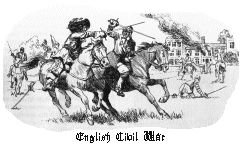Robert Herick, John Suckling, & Richard Lovelace

 |
Say how, or when Shall we thy guests Meet at those lyric feasts Made at the Sun, The Dog, the Triple Tun? Where we such clusters had As made us nobly wild, not mad; And yet each verse of thine Outdid the meat, outdid the frolic wine. My Ben |
2. What question is asked in the first 6 lines? 3. In lines 11-16, what does the speaker ask of Ben? In lines 17-20, what risks does the speaker describe if Ben does not respond? 4. In what ways were the speaker and others Ben Jonson’s guests? 5. The tone of this poem is melancholy. What words, phrases, and thoughts contribute to setting this melancholy tone? |
Old Time is still a-flying: And this same flower that smiles today Tomorrow will be dying. The glorious lamp of heaven, the Sun, That age is best which is the first, Then be not coy, but use your time; |
2. In stanza 1, why does the speaker advise the girls to gather rosebuds while they may? 3. According to stanza 3, what age is the best age, and what happens when it is passed? 4. In stanza 4, why does the speaker suggest that the young girls stop delaying and marry? 5. The central theme of this poem is the swift passage of time. What images express this theme? |
Three whole days together! And am like to love three more, If it prove fair weather. Time shall moult away his wings But the spite on 't is, no praise Had it any been but she, |
2. According to lines 3 and 4, what conditions are necessary for the speaker to continue to love? 3. In the second stanza, how long will it be before Time will find a lover as faithful as the speaker? 4. According to stanza 3, what reason does the speaker give for not leaving his lady for another “dozen dozen” women? 6. The poem is an elaborate compliment to a lady. What are the elements that contribute to this compliment? 7. What attitudes toward love and the woman are evident? In what way is the word “constant” ironic in the title? 8. What is being personified in stanza 2 and how does this apply to the poem as a whole? |
Prithee, why so pale? Will, when looking well can't move her, Looking ill prevail? Prithee, why so pale? Why so dull and mute, young sinner? Quit, quit for shame! |
2. In stanza 1, how does the lover look? 3. In stanza 2, what is the question the speaker asks? 4. How is stanza 3 different from the first two stanzas? 5. What caused the “fond lover” to look and behave the way that the speaker described? 6. What do you think is the lover’s actual emotional state? Explain. |
That from the nunnery Of thy chaste breast and quiet mind To war and arms I fly. True, a new mistress now I chase, Yet this inconstancy is such |
2. In the second stanza, whom does the speaker chase and what will he embrace? 3. According to the last stanza, why will the abandoned lady "adore" the speaker's "inconstancy"? 4. What is the "new mistress" the speaker refers to in the second stanza? 5. What do you believe is the "stronger faith" mentioned by the speaker in line 7? 6. What does the speaker mean when he says in lines 11-12, "I could not love thee, Dear, so much / Loved I not honor more"? 7. This poem is an argument made by the speaker to his lady-love in an effort to convince her to accept his leaving her for war. What details in the poem support this interpretation? |
Hovers within my gates, And my divine Althea brings To whisper at the grates; When I lie tangled in her hair, And fetter'd to her eye, The gods, that wanton in the air, Know no such liberty. When flowing cups run swiftly round When (like committed linnets) I
Stone walls do not a prison make, |
2. In lines 5-8, what does the speaker say gives him the greatest freedom? What conditions does the speaker describe in the second stanza as yielding the greatest freedom? 3. In the third stanza, when will the speaker know the greatest "liberty"? 4. What, in the last stanza, does the speaker say is required to enable him to enjoy the maximum freedom? What or who does the speaker say in the first three stanzas will experience no greater freedom than he? To what does the speaker compare his freedom in the last stanza? 5. The conditions for the speaker's freedom form a progressive movement in the first three stanzas. What is that movement? Summarize the speaker's conception of freedom. 6. In seventeenth-century England, part of the conflict between King Charles I and his rebellious Parliament was over freedom. Charles wanted to rule by "divine right," which meant basically that he could do as he wished. Parliament wished to take that right away from him. To Charles, this meant a loss of freedom. The Puritans in Parliament, on the other hand, felt that Charles had tried to take away their freedom of religion. From their point of view, it was either his freedom or their freedom that was at stake. In what way does Lovelace's poem, "To Althea," reflect this issue? Why does each stanza turn on the idea of "liberty"? 7. Some critics have called "To Althea" a love poem; others have said it was an expression of devotion to King Charles. Which interpretation do you believe is right and why? |